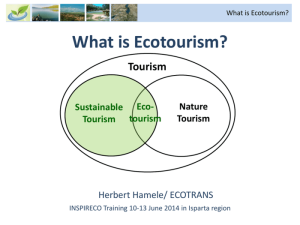
Embark on a journey into the world of Eco-Friendly Hotels for Travelers, where sustainability meets comfort and conscience. This insightful exploration delves into the significance of eco-friendly accommodations, their impact on the environment, and the benefits they offer to mindful travelers.
Introduction to Eco-Friendly Hotels

Eco-friendly hotels are accommodations that prioritize sustainability and environmental responsibility in their operations. These hotels aim to minimize their carbon footprint, reduce waste, conserve energy and water, and support local communities.
Significance of Eco-Friendly Hotels
- Contribution to environmental preservation and conservation efforts.
- Meeting the growing demand for sustainable travel options.
- Promoting responsible tourism practices.
- Inspiring other hotels to adopt eco-friendly initiatives.
Concept of Sustainability in Hotels
Sustainability in hotels involves implementing practices that meet the needs of the present without compromising the ability of future generations to meet their own needs. This includes using eco-friendly materials, reducing energy consumption, and supporting local economies.
Benefits of Staying in Eco-Friendly Hotels for Travelers
- Reduced environmental impact during travels.
- Supporting businesses that prioritize sustainability and social responsibility.
- Enjoying a unique and eco-conscious travel experience.
- Promoting sustainable tourism practices and inspiring others to follow suit.
Features of Eco-Friendly Hotels
Eco-friendly hotels are becoming increasingly popular among travelers who are conscious of their environmental impact. These hotels offer a range of sustainable practices and initiatives aimed at reducing their carbon footprint and promoting a greener way of living.
Renewable Energy Use
One of the key features of eco-friendly hotels is the use of renewable energy sources such as solar panels, wind turbines, or geothermal heating. By harnessing natural resources for energy production, these hotels reduce their reliance on fossil fuels and decrease greenhouse gas emissions.
Water-Saving Practices
Eco-friendly hotels implement water-saving practices to conserve this precious resource. This can include low-flow faucets and showerheads, dual-flush toilets, and water-efficient landscaping. By reducing water consumption, these hotels help protect local water sources and ecosystems.
Recycling Programs
Many eco-friendly hotels have comprehensive recycling programs in place to minimize waste generation. They encourage guests to separate recyclables from trash and ensure that materials like paper, plastic, glass, and metal are recycled properly. Some hotels even compost organic waste to further reduce their environmental impact.
Innovative Eco-Friendly Initiatives
Some eco-friendly hotels go above and beyond by implementing innovative sustainability initiatives. For example, there are hotels that use recycled materials in their construction, offer electric vehicle charging stations, or provide locally sourced organic food in their restaurants. These initiatives showcase the commitment of eco-friendly hotels to environmental stewardship.
Comparison with Traditional Hotels
When comparing eco-friendly hotels with traditional hotels, it is clear that the former have a lower environmental impact. Eco-friendly hotels prioritize sustainability in their operations, from energy and water conservation to waste management. Traditional hotels, on the other hand, may not have as many eco-friendly practices in place, leading to higher resource consumption and waste generation.
Design and Construction of Eco-Friendly Hotels

When it comes to designing and constructing eco-friendly hotels, sustainability is key. From utilizing eco-friendly materials to incorporating renewable energy technologies, these hotels are built with the environment in mind.
Sustainable Practices in Design and Construction
In the design and construction of eco-friendly hotels, sustainable practices are implemented to minimize environmental impact. This includes using recycled materials, reducing waste generation, and optimizing energy efficiency throughout the building process.
Eco-Friendly Materials and Technologies
Eco-friendly hotels make use of sustainable materials such as bamboo, reclaimed wood, recycled glass, and low-VOC paints to reduce their carbon footprint. Additionally, green technologies like solar panels, geothermal heating systems, and rainwater harvesting are integrated to promote energy efficiency and conservation.
Certification Processes for Eco-Friendly Hotels
To showcase their commitment to sustainability, eco-friendly hotels may undergo certification processes such as LEED (Leadership in Energy and Environmental Design). LEED certification evaluates various aspects of a building’s design, construction, and operation to ensure it meets stringent environmental standards and promotes a greener future.
Eco-Tourism and Sustainable Travel
Ecotourism refers to responsible travel to natural areas that conserves the environment, sustains the well-being of the local people, and involves interpretation and education. The principles of ecotourism include minimizing impact, building environmental and cultural awareness and respect, providing positive experiences for both visitors and hosts, and providing direct financial benefits for conservation.
Relationship between Eco-Friendly Hotels and Ecotourism
Eco-friendly hotels play a crucial role in supporting ecotourism by providing sustainable accommodation options for travelers who are conscious of their environmental impact. These hotels implement eco-friendly practices such as energy and water conservation, waste reduction and recycling, use of sustainable materials, and supporting local communities.
Supporting Sustainability through Eco-Friendly Hotel Choices
Travelers can support sustainability through eco-friendly hotel choices by selecting accommodations that have eco-certifications, such as LEED or Green Key, which indicate that the hotel meets specific environmental standards. Additionally, travelers can opt for hotels that actively engage in conservation efforts, support local communities, and offer eco-friendly amenities such as refillable toiletry dispensers and renewable energy sources.
In conclusion, Eco-Friendly Hotels for Travelers not only provide a unique and eco-conscious lodging experience but also contribute to the larger movement of sustainable travel. By choosing these green accommodations, travelers can make a positive difference while enjoying a responsible and rewarding stay.
FAQ
What are some common features of eco-friendly hotels?
Eco-friendly hotels often offer amenities such as renewable energy use, water-saving practices, and recycling programs to minimize their environmental impact.
How do eco-friendly hotels contribute to ecotourism?
By promoting sustainable practices and supporting local communities, eco-friendly hotels play a crucial role in fostering ecotourism principles and preserving natural resources.
What is the significance of LEED certification for eco-friendly hotels?
LEED certification ensures that eco-friendly hotels adhere to strict environmental standards in their design, construction, and operation, showcasing their commitment to sustainability.






